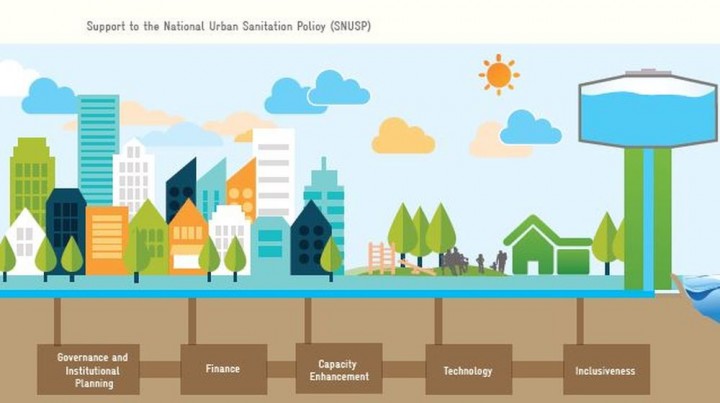Support to National Urban Sanitation Policy II Providing technical support in the areas that include systems for managing faecal sludge, operating models for public toilets and systems for non-conventional and decentralised wastewater management
Deutsche Gesellschaft für Internationale Zusammenarbeit (GIZ) GmbH
GIZ
The project "Support to National Urban Sanitation Policy (SNUSP) – II", supported the Indian government in implementation of its sanitation improvement schemes and missions such as National Urban Sanitation Policy (NUSP), Swachh Bharat Mission (Clean India Mission) and Atal Mission for Rejuvenation and Urban Transformation (AMRUT).

Mission
The objective of the project was to support the Indian government in making all Indian cities and towns totally sanitised, healthy and livable and ensuring sustainable improvement in public health and environment with special focus on the urban poor and women.Approach
The project buildt on the lessons learnt from the predecessor project in five cities in collaboration with three state governments. It applied these tested solutions and approaches at state level for large up-scaling. At the national level, the project worked together with the Ministry of Urban Development and training institutes. At the state level, it cooperated with selected state governments and regional training institutes and, at the local level, it cooperated with medium-sized cities, their administrations and elected representatives. This three-tier approach makes local solutions replicable, enables them to have a broad impact and promotes the vertical exchange of knowledge. The project worked in the states of Andhra Pradesh, Kerala, Maharashtra, Telangana and Uttarakhand. Together with its partners, the project prepared and disseminated guidelines for overall urban sanitation plans suitable for medium-sized cities, prepared quality criteria for investment projects and developed manuals for technical solutions. It capacitated state and city officials to manage sanitation better. With an aim to strengthen the sanitation sector, the project provided technical support in the areas that include systems for managing faecal sludge, operating models for public toilets with focus on women health & safety and systems for non-conventional and decentralised wastewater management.Results
GIZ-SNUSP has supported many cities in India to develop its City Sanitation Plans, to name but a few: Kochi, Nashik, Raipur, Shimla, Tirupati and Varanasi. Cities have been hand-held in implementing CSP activities like: • Rehabilitation of sewerage system • Hydraulic assessment of trunk sewer to avoid wastewater discharge in holy river Godavari • Capacity building of plumbers associated with Municipalities in the cities • Decentralised on-site waste water treatment system in areas where centralised conventional treatment systems are not viable i.e. coastal region and hilly ares • Improved public toilet facilities in densely populated areas • Improved sanitation condition in schools located in underserved areasExternal Website(s)
http://www.urbansanitation.org/
Answer questions about the project
Filter / Tags
Capacity developmentTechnology comparisonsCitiesCommunity sanitationOperation, maintenance and sustainable servicesPolitical processes and institutional aspectsSpecific to one or several countriesEmptying and transport (non sewered)Treatment of faecal sludgeFaecal sludge treatment processesGerman governmentUrban (entire city)PractitionersGovernment-owned entity (not university or research)
Related Countries
India

Project location
